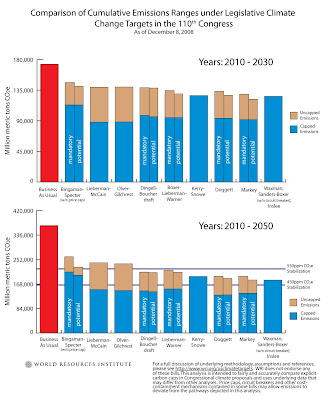TAX VS. CAP&TRADE – THE TAX GETS A BILL
Tough odds facing bill to impose carbon tax
John M. Broder, March 8, 2009 (International Herald Tribune)
SUMMARY
Representative John Larson (D-Conn) introduced House of Representatives legislation to tax greenhouse gas emissions, setting an initial moderate price and increasing it annually until emissions fall.
The tax would be revenue-neutral, meaning the monies collected for emissions would be returned to taxpayers in the form of lower payroll taxes.
The idea is to penalize emitters and encourage emissions reductions.
Most ecnomists are said to consider a tax potentially more efficient but politically unobtainable.
 click to enlarge
click to enlargeCurrently pending legislation in the Senate and House would cut emissions via a cap&trade system.
A cap&trade system caps emissions on big emitters. All permissions to emit (called credits or allowances) are initially auctioned by the government, generating revenues to fund New Energy and Energy Efficiency programs and infrastructure. Those who can do business below their cap (by becoming more efficient or investing in New Energy) can earn extra income by selling credits to those who need to emit beyond their limits to do business.
From NationalWildlife via YouTube.
In Europe, cap&trade is conducted via the European Union (EU) Emissions Trading Scheme (ETS). Its success is considered ambiguous.
Last fall, Canada’s Liberal Party suffered its worst defeat ever while calling for an emissions tax.
Republicans refused to support the 1993 Clinton-Gore energy tax proposal.
Representative Edward Markey (D-Mass) leads a House committee writing climate change legislation that includes cap&trade because he believes a tax is not politically possible.
The electorate may be particularly reluctant to accept a cap&trade market system so soon after its recent experience with Wall Street markets. click to enlarge
click to enlarge
COMMENTARY
- Some consider cap&trade more complicated and subject to gaming and scamming than a tax.
- Others say a tax can be just as complicated because it must be made revenue-neutral.
- Tax proponents say a market system is subject to players, scammers and gaming.
- Cap&trade proponents say the experience of the IRS proves a tax is even easier to cheat than a market.
- Tax proponents say a tax can be more readily tightened to produce emissions reductions.
- Cap&trade proponents say a market can be regulated and can be more effective than a tax because it strictly caps emissions.
- The EU ETS had severe price fluctuations early on but stabilized last year until the international economic downturn. click to enlarge
click to enlarge
- European emissions have not dropped significantly but have also not risen significantly and might have without caps.
- President Obama and Congressional leaders favor cap&trade even though it is likely to mean higher power prices in the short run. They say they will offset increased power prices with tax cuts and other public benefits.
- Callling for a huge new tax and convincing the electorate it can really be revenue-neutral is considered a political “bridge-too-far.”
- The tax is advocated largely by idealists who see cap&trade as imperfect and corruptible, like all markets, and cynics whose advocacy of a tax over cap&trade appears to affirm the importance of putting a price on emissions but who, in reality, know the political controversy postpones action on emissions reductions. click to enlarge
click to enlarge
- Al Gore (who once said "We should tax what we burn, not what we earn…") advocates both, the tax because it is more perfect and cap&trade because it is now, finally, obtainable by an international agreement.
- The cap&trade system set up to stop acid rain under the 1990 Clean Air Act produced more pollution reductions and lower costs than expected. Tax advocates say the acid rain system was set up to cut only sulfur dioxide and nitrogen at coal plants, a much simpler proposition than cutting the ubiquitous carbon dioxide and other greenhouse gas emissions from a wide-ranging set of sources. click to enlarge
click to enlarge
QUOTES
- Congressman Larson: "The American people want us to level with them…We create price certainty without any new bureaucracies or complicated auction schemes."
- Congressman Markey: "I am aware of the economic arguments for a carbon tax…but politics is the art of the possible, and I think cap-and-trade is possible."
- Yvo de Boer, Director, UN climate change program: "If you were a pure economist, the most logical thing is taxation. It is the simplest…But 'taxation' is a word that makes people choke in normal times. And these are not normal times."
- Al Gore: "For more than 20 years, I have supported a CO2 tax offset by an equal reduction in taxes elsewhere…However, a cap-and-trade system is also essential and actually offers a better prospect for a global agreement, in part because it is difficult to imagine a harmonized global CO2 tax. Moreover, I have long recognized that our political system has special difficulty in considering a CO2 tax even if it is revenue neutral."








0 Comments:
Post a Comment
<< Home